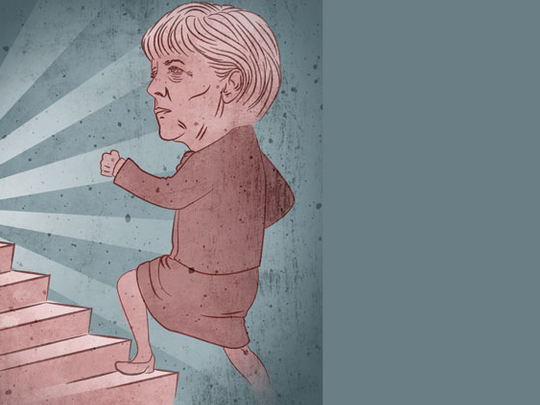
Over the past week, some of Germany’s most prestigious newspapers have almost all but given up reporting on the election campaign under way in Europe’s biggest country. It has simply become too boring.
Yet, the elections tomorrow are ultimately very important. The interesting question is not so much who is going to be the next chancellor — that seems all but settled. The important question is whether the new German parliament is more or less likely to agree to steps to a resolution of the Eurozone crisis. The important player to watch will be the opposition Social Democratic party (SPD). Depending on the result, it may or may not shift its position.
The SPD has not gained any traction against Angela Merkel, the Chancellor. Perhaps more than any other social democratic party in the West, it has bought into the neoclassical economic policy consensus. That makes it hard to find a narrative with which to attack Merkel.
At times, it slams the imposition of austerity in southern Europe; at other times it complains that Merkel’s policies are too expensive. More importantly, the SPD has supported the chancellor in all of the big votes on Eurozone policy, only extracting minimal concessions — the daftest of which was the financial transactions tax, which is unlikely to see the light of day in any meaningful form.
If and when the party’s ageing leadership retires, or is swept away by bad results, a younger generation might offer a different perspective. Perhaps then we might reach a position where one of several methods of crisis resolution in the Eurozone could occur.
For that to happen, the SPD will also have to remember what it has long forgotten: That large economies cannot be run on autopilot; that adjustments have to be made, not postponed; that unsustainable debts have to be written off and that a basic requirement of monetary union is a proper banking union — not the one we are about to get. A real banking union is one with a single central backstop, not one where every country is responsible for its own banking sector.
Some of this may merely involve the SPD returning to more balanced macroeconomic polices, such as those advocated by Karl Schiller, the party’s former economics minister, in the late 1960s and early 1970s, or later by Helmut Schmidt, when he was chancellor. Back then, the SPD’s economic policy narrative was more advanced and more modern than its current position. In particular, it recognised the needs for stimulus programmes during recessions and for overall macroeconomic stability — as opposed to a single-minded pursuit of fiscal stability and price stability. I blame Gerhard Schroder for this change. The former chancellor has been the party’s most effective politician in the past 30 years. He won two successive elections and almost won a third in 2005, but he bequeathed his party with a supply-side agenda best characterised by his labour reforms, which has trapped it ever since.
Once you move beyond this admittedly boring election campaign, and the still intriguing political arithmetic, there is actually quite a bit at stake, but this is not reflected in the political debate. The outcome of the Eurozone crisis in particular will depend to a large extent on how the SPD performs at the ballot box.
Here are some possible scenarios. If the current centre-right partnership of Christian Democrats and liberal Free Democrats fails to get a majority, the SPD may end up being pushed into a grand coalition with Merkel. In that case, expect little immediate change. Any serious debate about a renewal inside the party will be put on ice. Merkel tamed the SPD during the last grand coalition from 2005 until 2009 and that will probably happen again.
If the SPD and the Greens were to win the elections outright, they would probably move faster than the Merkel coalition on crisis management, simply because they would have a majority in both chambers of the parliament. I will not expect any fundamental policy shifts right away, but certainly a change of tone. Not a single poll, however, has come even close predicting such a possibility.
The outcome becomes truly interesting if the present coalition wins — in a twisted sort of way. The bad news is that not much will change initially. I can see new packages to tie Greece, Cyprus and Portugal over until the next crisis. But I cannot see any effective debt relief, which is what is needed to resolve the crisis. A CDU-FDP coalition will do the minimum needed to prevent an immediate break-up of the single currency but no more. If Germany is to ever change its position, it will most likely see this happening first on the left. And herein lies the potentially good news. The SPD is more likely to renew when in opposition than when in government.
For those who support both the SPD and a more enlightened crisis resolution strategy, it is not clear what they should wish for; perhaps a big victory or a big defeat but certainly not the twilight result the polls are predicting.
— Financial Times










